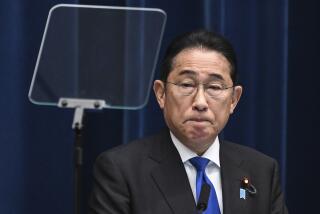Dying to Save the Party? Sympathy Vote Precedent Cited in Japan
- Share via
TOKYO — Foreign Minister Kabun Muto came up with a new idea to help the beleaguered Liberal Democratic Party retain its 38-year grasp on government in Japan--but it wasn’t a very diplomatic one.
Recalling that the death of Prime Minister Masayoshi Ohira in the midst of a 1980 election campaign spurred an outpouring of sympathy votes that swept the Liberal Democrats to an unexpected landslide victory, Muto said that Prime Minister Kiichi Miyazawa’s death could rescue the ruling conservative party’s fortunes in the July 18 election.
Muto did add that Miyazawa is in excellent heath, so such an event is unlikely.
After television showed Muto’s speech, commentators condemned the foreign minister for poor taste.
Muto’s remark was the first from a ruling party leader virtually conceding defeat. He recalled Ohira’s death as an example of what it would take to win the election, called last Friday after Miyazawa lost a no-confidence vote in Parliament.
Rebel Liberal Democrats joined with opposition lawmakers to defeat the prime minister for breaking promises to pursue political reform that the public demands after a five-year series of exposes of political corruption.
Muto said the Liberal Democrats, if defeated, would seek to form a coalition government with the Japan New Party, a conservative group created last year by a former governor, Morihiro Hosokawa.
Resignations Tuesday by 36 rebels--one more than expected--left the Liberal Democratic Party holding only 228 seats in the lower house of Parliament--28 short of a majority. The rebels were led by former Finance Minister Tsutomu Hata and Ichiro Ozawa, former secretary general of the party. Eight Hata-Ozawa followers in the upper house also resigned, leaving the party with only 106 seats, 21 short of a majority in that chamber.
More to Read
Sign up for Essential California
The most important California stories and recommendations in your inbox every morning.
You may occasionally receive promotional content from the Los Angeles Times.













